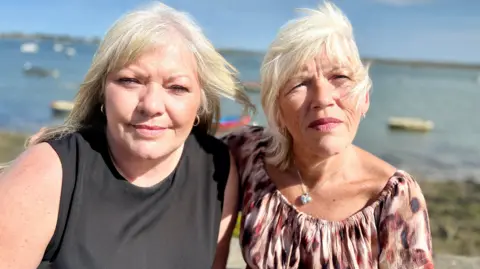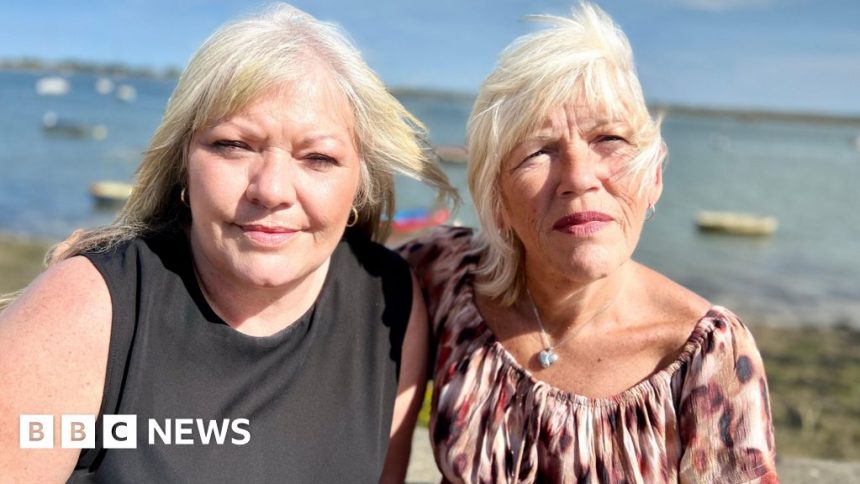‘Our sons died – we want mental health inquiry to bring change’
 Nikki Fox/BBC
Nikki Fox/BBCFor mothers Melanie Leahy and Lisa Morris, the long wait for a full public inquiry into the deaths of mental health patients in Essex is finally over.
On Monday Baroness Lampard will open fresh proceedings examining the deaths of inpatients under the care of successive NHS trusts over 23 years. The findings could have implications for mental healthcare nationally.
Among those who have lost their lives is Melanie’s son, Matthew, who was found unresponsive at a unit now operated by Essex Partnership University Trust (EPUT) in 2012.
When asked what she wants from the inquiry, her answer is simple – “no more deaths”.
Twenty-year-old Matthew had been taken to the Linden Centre in Chelmsford after being detained under the Mental Health Act.
He had been under the care of the Early Intervention in Psychosis team operated by one of EPUT’s predecessor organisations, the North Essex Partnership NHS Trust (NEP).
Days before his death he reported he had been raped while in the unit, but following a visit the police took no further action.
But staff did not follow the trust’s own policy following the allegations and it emerged his care plan had been falsified. It was written after his death.
 Family handouts
Family handoutsHis mother says she wants the inquiry to use its enhanced powers to obtain documents that she has still not seen.
“There’s things like internal investigations, internal statements. I’ve never read them. There are documents that I’ve never been privy to and they need to be produced now,” she says.
“It’s been a battle to get this far.”
An ombudsman’s report in 2020 stated NEP failed to properly allocate a key worker to Matthew. It also did not plan his care effectively, engage consistently with him, manage observations appropriately, assess or manage the risk fully or do enough to look after his physical health.
A jury inquest in 2015 concluded Matthew “was subject to a series of multiple failings and missed opportunities over a prolonged period of time by those entrusted with his care”.
‘Interconnected failures’
Ben Morris also died while an inpatient at the Linden Centre in 2008, aged 20.
The year before, the wardrobe he had used to hang himself had been identified as “low risk” but was subsequently fixed to a wall, making it more dangerous.
His mother, Lisa, wants the inquiry to ensure “good care for the next generation of mental health patients”.
“I don’t want to see this happen to any other families, ever,” she says.
 Pete Walker/BBC
Pete Walker/BBCIn 2021, EPUT was convicted under the Health and Safety at Work Act and fined £1.5m in relation to 11 deaths at the Linden Centre and other settings, then operated by the North Essex Partnership between 2004 and 2015.
The prosecution said the existence of “fixed potential ligature points” amounted to breaches of safety laws.
In his sentencing remarks, Mr Justice Cavanagh wrote: “At the heart of this case are a number of interconnected failures by the trust.”
Both Matthew and Ben’s cases featured in the prosecution and EPUT’s chief executive Paul Scott apologised, stating it was committed to learning lessons.
‘I want answers’
The proceedings are getting under way after the original inquiry was upgraded and placed on a full statutory footing, with a new chair appointed.
It comes 16 years after Ben died.
“He would have been 36 in September,” says his mum. “I think about it all the time.”
Ms Morris hopes the new powers will allow the chair to “dig deep” and compel more witnesses to give evidence.
She points out that only a handful of former staff came forward at the previous inquiry.
For Ms Leahy, it is “too painful” to think about what her life would have been like if her son was still alive.
She has to shut down certain emotions “to be able to function”, she says.
What does she hope this inquiry will achieve?
“Change. Obviously I want my answers but meaningful change. Everything that’s happened in Essex has happened elsewhere, because the whole system needs a radical shake-up.”
 Hodge Jones and Allen
Hodge Jones and AllenPriya Singh, a solicitor whose firm currently represents 126 families, says: “This is as important as the Post Office inquiry, as the infected blood inquiry.”
The families have sent letters to Health Secretary Wes Streeting asking for a meeting to help ensure any learnings from the inquiry are embedded across all mental health services.
“The families have to have their voices heard. If their voices are heard then change is going to happen,” she adds.
Following a consultation, the new Terms of Reference were published earlier this year.
The Lampard Inquiry now begins its phase two, with public hearings as it gathers evidence.
Ms Morris wants to see real change in the way mental health inpatients are looked after.
At the top of her list are “good, safe hospitals with staff that care”.
For her friend Melanie, it boils down to one word: “Accountability.”
Ahead of the inquiry, EPUT’s chief Mr Scott said his thoughts were with those who had lost loved ones.
“We will continue to do all we can to support Baroness Lampard and her team to provide the answers that patients, families and carers are seeking,” he said.
The North East London Foundation Trust (NELFT), which provides child and adolescent mental health services in parts of Essex and will also be examined in the inquiry, said: “We will continue to work with the inquiry to help families understand the circumstances surrounding the loss of their loved ones.
“Patient safety is our absolute priority and we are committed to learning from the work of the inquiry.”
- If you have been affected by the issues in this story, help and support is available via the BBC Action Line
Follow Essex news on BBC Sounds, Facebook, Instagram and X.






